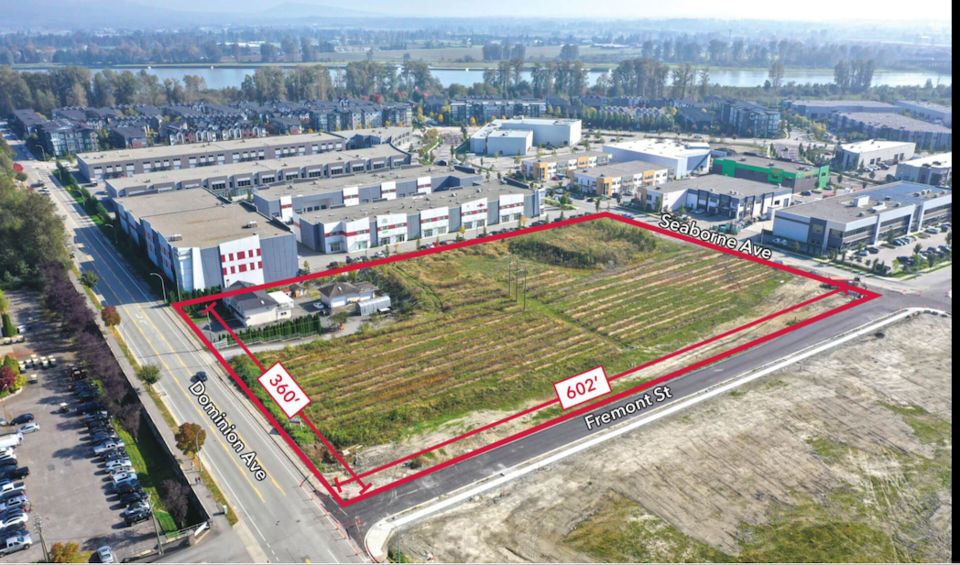Metro Vancouver’s rapidly diminishing base of industrial land is forcing industry to consider new ways and new places - to meet demand that shows no signs of slowing down.
“We’re at a critical land supply shortage in the region, and persistent vacancy below 1 per cent, and we need to find creative solutions to create new supply for the market,” says Jason Kiselbach, senior vice-president and regional managing director in Vancouver with CBRE Ltd.
Metro Vancouver released a survey of the region’s industrial land supply last year that identified 3,126 acres of vacant, undeveloped industrial land. But it noted that not all those properties are suitable for current users, meaning absorption lags actual demand.
The report notes that the average size of parcels is less than five acres, too small for major warehouse development. While the report suggests that the supply could last into the 2030s, CBRE suggests that realistic estimates put the developable land supply at closer to six to eight years.
“You just can’t deliver supply fast enough. It’s just being absorbed, and we don’t see that demand drying up in the near term,” Kiselbach said. “We’re not able to get more of that supply to the market.”
According to CBRE’s industrial market report for the first quarter, Vancouver leads the country with the highest asking sales price of $575 per square foot, followed by Toronto at $346.22. But in markets such as Richmond, prices are cresting $750 a square foot.
The impacts of such dramatic escalations are felt across the market.
“The strata market has been the key driver of land,” Kiselbach said. “That doesn’t help the critical shortage of space available for leasing, especially mid-bay or even large-format space.”
While approximately nine million square feet is under construction in Metro Vancouver, 80 per cent is spoken for. Moreover, upward pressure on lease rates has made landlords reticent to enter long-term leases unless there’s room to reset rents midway through.
“They don’t want to lock in at today’s pricing,” Kiselbach said. “They want to do a shorter-term deal and have the ability to review that lease rate sooner.”
But relieving pressure on lease rates in a space-constrained market like Vancouver won’t be easy.
With several uses competing for available sites, all users have to make better use of the land base they’ve got. This favours strata units, which are typically smaller units that lend themselves well to densification. Stacking is more difficult for large-format warehouses, which require cross-docking and parking.
Sometimes, it takes creative thinking – and lots of patience – to secure additional land.
Conwest Group hopes to develop a 600,000-square-foot warehouse on three parcels in Langley adjacent to Gloucester Industrial Estates. A 2017 court decision cleared the way for exclusion of the properties from the Agricultural Land Reserve. Conwest Group satisfied the conditions necessary for exclusion earlier this year. Rezoning of the site passed third reading on May 9 and the proposal will next head to Metro Vancouver for approval.
Conwest COO Ben Taddei says the process illustrates the potential for projects to move forward in the region but admitted there are plenty of hurdles left to clear. Construction is unlikely for at least three years.
In Port Coquitlam, a May sale of light-industrial land topped more than $2 million an acre. The five-acre property, located at 590 Dominion Ave., was sold for $10.65 million to a private company, according to commercial real estate broker Lee & Associates of Vancouver
Some developers and tenants are looking further afield.
Last summer, Denciti Development Corp. and Kadestone Capital Corp. purchased 8.5 acres in Squamish to serve local companies. Plans call for light industrial units serving arrange of manufacturing and tech companies, many of which have chosen to stay in Squamish. This has made the market a viable option to Metro Vancouver, especially for those companies with roots in the Sea to Sky corridor or seeking to serve businesses in Whistler and beyond.
Similarly, Beedie recently unveiled plans for the Stratosphere Business Centre on 14.7 acres adjacent to Kelowna International Airport.
But some companies are taking a close look at relocating further afield.
“We’re hearing from clients that own properties in both provinces now that they’re seeing the same names show up on tour sheets in both Vancouver and Calgary, and sometimes Edmonton as well,” Kiselbach said.



